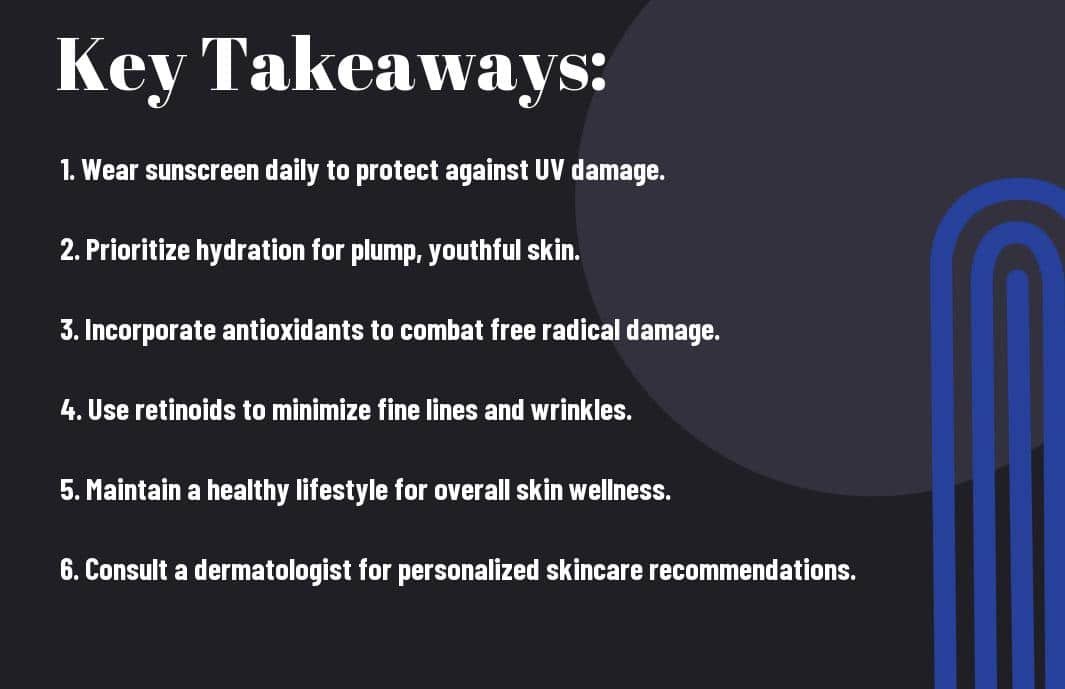Fountain Of Youth: Behold, as we uncover the secrets to maintaining youthful and radiant skin even as the years pass. In a world filled with endless skincare options, it can be overwhelming to navigate through the sea of products and treatments. However, with the right knowledge and approach, achieving ageless beauty is not an unattainable dream. In this comprehensive guide, we will delve into the most effective skincare tips and techniques for aging gracefully, while also shedding light on the most dangerous pitfalls to avoid along the way. Learn how to nurture your skin and embrace the natural aging process with confidence and grace.
Key Takeaways:
- Sun protection is essential: Daily use of broad-spectrum sunscreen with SPF 30 or higher can help prevent premature aging and reduce the risk of skin cancer.
- Moisturize for supple skin: Hydrating your skin with a good moisturizer helps maintain its elasticity, reduce the appearance of fine lines, and keep it looking youthful.
- Invest in anti-aging skincare products: Look for products containing retinoids, hyaluronic acid, and vitamin C to minimize wrinkles, improve skin texture, and promote a radiant complexion.

The Science of Skin Aging
While the concept of aging is often associated with wisdom and experience, the physical signs of aging can be less than welcome. Understanding the science behind skin aging can aid in the development of an effective anti-aging skincare routine. By identifying the biological and environmental factors that contribute to skin aging, we can take proactive steps to maintain a youthful complexion.
Biological Factors
Any discussion of skin aging must begin with an examination of the biological factors at play. Genetics play a significant role in how our skin ages, determining skin thickness, elasticity, and collagen production. Furthermore, hormonal changes, particularly the decrease in estrogen as women approach menopause, can lead to thinning skin and decreased moisture levels. Exposure to UV radiation and pollution can also accelerate the aging process by causing oxidative stress and inflammation. These factors can lead to a loss of skin firmness, increased wrinkles, and uneven skin tone.
- Genetics: Determine skin characteristics
- Hormonal changes: Influence skin thinning and moisture levels
- UV radiation and pollution: Lead to oxidative stress and inflammation
Though genetics and hormonal changes are non-modifiable factors, safeguarding the skin from the sun and pollutants and adopting a healthy lifestyle and skincare routine can mitigate their effects.
Environmental Factors
Biological factors aside, environmental elements also play a significant role in skin aging. Exposure to UV radiation is the primary environmental factor contributing to premature aging. The sun’s UV rays can cause photoaging, hyperpigmentation, and skin cancer. Furthermore, smoking and poor nutrition can impair collagen production and skin healing, leading to wrinkles, sagging skin, and uneven skin tone.
- UV radiation: Causes photoaging, hyperpigmentation, and skin cancer
- Smoking and poor nutrition: Impair collagen production and skin healing
Biological factors and environmental factors, when combined, can significantly impact the aging process, leading to visible signs of aging. Hence, it is vital to address both intrinsic and extrinsic factors to maintain youthful skin.

Fundamentals of Skincare
Keep your skin healthy and youthful by following these fundamental skincare tips. From hydration to exfoliation, these practices will help you age gracefully and maintain a radiant complexion.
The Importance of Hydration
With age, our skin tends to lose moisture and elasticity, leading to fine lines, wrinkles, and dullness. That’s why hydration is crucial for maintaining a youthful appearance. Drinking an adequate amount of water and using hydrating skincare products can help plump up the skin, reduce the appearance of fine lines, and give you a radiant glow. In addition to external hydration, incorporating hydrating ingredients like hyaluronic acid into your skincare routine can help retain moisture and improve skin texture.
Cleansing: The Foundation of Healthy Skin
Hydration alone is not enough to achieve healthy and youthful skin. Proper cleansing is essential for removing impurities, excess oil, and dead skin cells that can clog pores and contribute to a dull complexion. By cleansing your skin twice a day, you can maintain a clean and clear canvas for other skincare products to effectively penetrate and work their magic. Look for gentle cleansing formulas that won’t strip the skin of its natural oils, as this can lead to imbalanced and irritated skin.
Cleansing is the first step in any skincare routine and sets the stage for the following steps of hydration, exfoliation, and moisturizing. It is a vital component in maintaining healthy and youthful skin, so be sure to cleanse diligently and thoroughly.
The Role of Exfoliation in Renewal
Renewal of the skin is key to achieving a youthful and radiant complexion. Exfoliation helps to slough off dead skin cells, promote cell turnover, and unclog pores, revealing fresher and more youthful skin. Using exfoliating products with ingredients like alpha hydroxy acids (AHAs) and beta hydroxy acids (BHAs) can help improve skin texture, tone, and overall appearance.
Plus, regular exfoliation can also enhance the efficacy of other skincare products, allowing them to penetrate the skin more effectively. However, it’s important to exfoliate gently and not overdo it, as over-exfoliation can lead to skin irritation and sensitivity.
Moisturizing: Locking in the Youth
Locking in moisture is essential for maintaining youthful and healthy skin. Using a moisturizer helps to hydrate the skin, strengthen its barrier function, and prevent moisture loss, ultimately protecting it from environmental stressors. Look for moisturizers that contain hydrating and antioxidant ingredients to keep your skin nourished and protected.
Skincare experts recommend applying moisturizer twice a day, after cleansing and toning, to maintain optimal hydration and lock in the youthful appearance of your skin. Whether you have dry, combination, or oily skin, finding the right moisturizer is crucial for a balanced and healthy complexion.
Advanced Skincare Strategies
Despite the inevitable aging process, there are advanced skincare strategies that can help you maintain youthful, glowing skin. Incorporating these advanced techniques into your skincare routine can make a significant difference in how your skin ages. Utilizing antioxidants, retinoids, peptides, growth factors, and sunscreen can help protect, repair, and maintain your skin’s youthfulness.
- Antioxidants: The Ultimate Protectors
- Retinoids: The Gold Standard in Anti-Aging
- Peptides and Growth Factors
- Sunscreen: The Underrated Anti-Aging Hero
Antioxidants: The Ultimate Protectors
Any effective anti-aging skincare regimen should include antioxidants. These powerful compounds help neutralize free radicals and prevent oxidative stress, which can lead to premature aging. Antioxidants such as vitamin C, vitamin E, and green tea extract can help protect the skin from environmental damage and promote a youthful complexion.
Retinoids: The Gold Standard in Anti-Aging
The use of retinoids is widely regarded as the gold standard in anti-aging skincare. The effectiveness of retinoids in reducing fine lines, wrinkles, and improving skin texture has been extensively studied and proven. The use of retinoids can also help stimulate collagen production and increase cell turnover, resulting in smoother, firmer, and more youthful-looking skin.
Plus, retinoids can also help improve skin tone, reduce hyperpigmentation, and unclog pores, making them a versatile and essential component of an anti-aging skincare routine.
Peptides and Growth Factors
Peptides and growth factors are essential for promoting collagen production and maintaining skin elasticity. These powerful ingredients can help improve the appearance of fine lines and wrinkles, as well as enhance overall skin firmness and resilience. The inclusion of peptides and growth factors in your skincare routine can significantly contribute to a more youthful and rejuvenated complexion.
- Peptides stimulate collagen production
- Growth factors enhance skin firmness
The incorporation of these protectors in your daily skincare regimen can help combat the visible signs of aging and promote a more youthful and radiant complexion.
Sunscreen: The Underrated Anti-Aging Hero
Peptides and antioxidants may be crucial, but sunscreen is the most crucial. Using a broad-spectrum sunscreen with at least SPF 30 daily is essential in protecting your skin from harmful UV rays which can cause premature aging, wrinkles, and sunspots. Consistent use of sunscreen is one of the most effective anti-aging measures you can take to maintain healthy and youthful-looking skin.
Nutritional Keys to Radiant Skin
For centuries, people have sought the secret to maintaining youthful and radiant skin. While there is no magical potion or elixir, the foundation of healthy and glowing skin begins with the foods we consume. Our diet plays a crucial role in nurturing our skin from within, and understanding the nutritional keys to radiant skin is essential for aging gracefully.
Vitamins Essential for Skin Health
Skin health is heavily reliant on the intake of essential vitamins. Vitamin C is a powerful antioxidant that helps to protect the skin from damage caused by harmful free radicals. Vitamin E is another vital nutrient that supports skin health by providing protection against sun damage and aiding in skin repair. Ensuring an adequate intake of Vitamin A is also crucial for maintaining healthy skin cell production and overall skin appearance.
Vitamin B complex vitamins, including biotin and niacin, are essential for maintaining healthy skin. They help to support the skin’s barrier function, improve hydration, and reduce inflammation, resulting in a more youthful complexion. Including a variety of fruits, vegetables, and whole grains in your diet can help ensure you are getting a good balance of these essential vitamins for radiant skin.
Minerals and Fatty Acids
Vitamins are not the only nutrients crucial for radiant skin; minerals and fatty acids also play a significant role. Zinc is a mineral that supports skin cell renewal and has anti-inflammatory properties, while omega-3 fatty acids help to maintain the skin’s natural oil barrier, keeping it hydrated and supple.
To support the body’s natural production of collagen, skin-rejuvenating minerals like selenium and copper are necessary. Incorporating foods such as nuts, seeds, and seafood into your diet can help ensure you are getting an adequate supply of these essential minerals and fatty acids for healthy and youthful-looking skin.
Additionally, consuming a diet rich in antioxidants, such as vitamins A, C, and E, can help protect the skin from oxidative stress and premature aging caused by environmental factors like UV radiation and pollution.
The Impact of Diet on Skin Aging
Radiant skin is a reflection of what we put into our bodies. Our diet plays a pivotal role in the aging process of our skin, influencing its resilience, elasticity, and overall appearance. Consuming a diet rich in antioxidant-rich foods, essential vitamins, minerals, and fatty acids can help combat the visible signs of aging and promote a more youthful complexion.
This holistic approach to skincare acknowledges the intrinsic connection between diet and skin health, emphasizing the importance of nourishing our bodies from the inside out. By adopting a nutrient-rich diet, we can effectively support our skin’s natural regeneration processes and maintain a radiant and youthful glow as we age.
Lifestyle Adjustments for Age-Defying Skin
Unlike the mythical search for the fountain of youth, the key to age-defying skin lies in making conscious lifestyle adjustments. Stress, lack of exercise, and poor sleep patterns can take a toll on our skin, causing premature aging and dullness. By implementing certain changes in our daily routines, we can combat these factors and achieve glowing, youthful skin that defies the effects of time.
The Detrimental Effects of Stress
The impact of chronic stress on skin aging is profound. High levels of stress trigger the release of cortisol, a hormone that leads to increased oil production and inflammation in the skin, resulting in acne breakouts, premature wrinkles, and dullness. Additionally, stress can impair the skin’s ability to repair itself and maintain hydration, leading to a compromised skin barrier and increased sensitivity. To combat these effects, adopting stress-reducing activities such as meditation, yoga, or deep breathing exercises can significantly improve skin health and slow down the aging process.
Exercise: Boosting Skin Vitality
Skin cells thrive on physical activity. Regular exercise enhances blood circulation, delivering essential nutrients and oxygen to the skin, while simultaneously carrying away harmful toxins. Furthermore, exercise promotes the production of collagen, the protein responsible for skin elasticity and firmness, resulting in a visible reduction in the appearance of wrinkles and sagging. For instance, a brisk walk, a yoga session or a dance class can effectively revitalize the skin, leaving it with a radiant, youthful glow.
For instance, engaging in activities that elevate the heart rate, such as running or swimming, can significantly boost the skin’s natural ability to repair and regenerate, leading to a more youthful and radiant complexion.
Beauty Sleep: More Than Just a Myth
Boosting skin vitality starts with a good night’s sleep. During sleep, the body undergoes crucial processes of repair, regeneration, and detoxification, crucial for maintaining youthful, healthy skin. Lack of adequate sleep can lead to increased levels of cortisol, the stress hormone, resulting in decreased collagen production, fine lines, and dark circles. By prioritizing quality sleep, individuals can diminish these negative effects and wake up with refreshed, glowing skin.
More importantly, during deep sleep, the skin’s blood flow increases, allowing for enhanced absorption of skincare products and facilitating the renewal of skin cells, ultimately contributing to a more youthful complexion.

Aesthetic Procedures: When Skincare Meets Technology
Your skincare routine may already include a range of products and natural remedies, but sometimes, technology can offer advanced solutions to achieve youthful skin. Aesthetic procedures combine the power of skincare with cutting-edge technology to address a variety of aging concerns. From chemical peels and microdermabrasion to laser therapy and injectable treatments, these procedures can help you achieve a more youthful appearance.
Chemical Peels and Microdermabrasion
Peels and microdermabrasion are popular aesthetic procedures that target skin texture and tone. Chemical peels involve the application of a chemical solution to exfoliate the outer layers of the skin, revealing smoother and more radiant skin underneath. On the other hand, microdermabrasion utilizes a minimally abrasive instrument to gently sand the skin, removing the thicker, uneven outer layer. Both treatments stimulate collagen production, helping to reduce the appearance of fine lines, wrinkles, and age spots.
Laser Therapy and Its Variants
Laser therapy has revolutionized the field of aesthetic procedures, offering a range of treatments to address various skin concerns. Laser resurfacing can effectively minimize wrinkles, scars, and blemishes, while laser hair removal provides a long-term solution for unwanted hair. Skincare experts recommend laser therapy for its precision and effectiveness in targeting specific skin issues, ultimately revealing a more youthful and rejuvenated complexion.
To ensure safety and optimal results, it’s important to consult with a qualified skincare professional and discuss the most suitable laser therapy option based on your skin type and concerns. Additionally, proper post-treatment care and sun protection are essential to maximize the benefits of laser therapy and maintain skin health.
Injectable Treatments: Fillers and Neurotoxins
One of the most common aesthetic procedures involves the use of injectable treatments such as dermal fillers and neurotoxins. Fillers are used to restore volume and plumpness to areas of the face that have lost elasticity and fullness due to aging. On the other hand, neurotoxins can temporarily relax facial muscles, reducing the appearance of wrinkles and fine lines.
These treatments offer immediate results with minimal downtime, making them a popular choice for individuals seeking a non-surgical approach to combat signs of aging. However, it’s crucial to seek treatment from a qualified and experienced skincare professional to ensure safety and natural-looking results.
Surgical Options: Last Resorts
Therapy If non-invasive treatments do not provide the desired results, surgical options may be considered as a last resort. Procedures such as facelifts, eyelid surgery, and neck lifts can address more advanced signs of aging, providing significant and long-lasting results. While these procedures carry higher risks and longer recovery periods, they can effectively rejuvenate the appearance of aging skin.
Microdermabrasion is often combined with surgical options to improve skin texture and promote faster healing. It’s important to thoroughly research and consult with a board-certified plastic surgeon prior to undergoing any surgical procedure to ensure the highest level of safety and expertise.
The Future of Anti-Aging
Not all hope is lost when it comes to aging gracefully. In fact, the future of anti-aging looks more promising than ever, thanks to groundbreaking advancements in scientific research and skincare technology. Nature’s Fountain of Youth: Unveiling Anti-Aging Natural …
Breakthroughs in Genetic Research
An exciting area of anti-aging research lies in genetic studies. Scientists are uncovering crucial information about how our genes influence the aging process, and are identifying specific genes that may be responsible for aging-related issues. Understanding the genetic basis of aging opens up new possibilities for targeted anti-aging treatments and interventions. This breakthrough has the potential to revolutionize anti-aging skincare, offering tailored solutions that address individuals’ genetic predispositions to aging.
In addition, genetic research has also shed light on the role of telomeres in aging. Telomeres, the protective caps at the end of chromosomes, play a key role in cellular aging. By understanding how telomeres function, researchers are exploring ways to preserve their length and delay cellular aging, offering new possibilities for anti-aging interventions.
Stem Cells and Regenerative Medicine
Stem cells and regenerative medicine have emerged as a promising frontier in anti-aging research. Stem cells have the remarkable ability to develop into different cell types in the body, making them a valuable asset in repairing and rejuvenating aging tissues. Research in this area has shown great potential for developing innovative skincare treatments that harness the regenerative power of stem cells to reverse the visible signs of aging.
Recent studies have also demonstrated the ability of stem cells to promote collagen production and improve skin elasticity, addressing common concerns such as wrinkles and sagging skin. This exciting progress in stem cell research is paving the way for the development of revolutionary anti-aging skincare products that offer tangible results.
Research into stem cells and regenerative medicine in anti-aging skincare is still in its early stages, but the potential implications for the future of age-defying treatments are immense. The prospect of harnessing the regenerative capacity of stem cells to restore youthful skin is an area of great interest and investment within the skincare industry.
The Promising Horizon of Biotechnology in Skincare
Research in biotechnology has opened up new frontiers in the quest for effective anti-aging solutions. Biotechnological advances have led to the discovery of novel ingredients and formulations that can target specific mechanisms of skin aging, offering the potential for unprecedented efficacy in anti-aging skincare products. These innovations hold the key to addressing age-related skin concerns with greater precision and efficacy than ever before.
Any discussion of biotechnology in skincare must also encompass the remarkable strides made in the field of personalized skincare. By leveraging biotechnological advances, skincare companies are exploring the development of personalized anti-aging treatments tailored to individuals’ unique skin profiles and aging concerns. This personalized approach has the potential to revolutionize the way we address aging, offering bespoke solutions that truly cater to each person’s specific needs.
To wrap up
From above skincare tips to lifestyle changes, there are many ways to embrace aging gracefully and maintain youthful skin. By taking a holistic approach to skincare, including regular use of sunscreen, a healthy diet, and a consistent skincare routine, you can keep your skin looking youthful and radiant. It’s important to remember that aging is a natural process, and while it’s essential to take care of your skin, it’s also important to embrace the changes that come with getting older.
By following these tips and making small changes to your daily routine, you can age gracefully and feel confident in your skin at any age. Remember that everyone’s skin is unique, so it’s essential to find a skincare routine that works best for you and your specific needs. With dedication and proper care, you can unveil your own fountain of youth and feel confident in the skin you’re in.
Also Read: Rejuvenate Your Skin With Advanced Laser Therapy At Our Skin Care Hospital
FAQs
Q: What is the fountain of youth and how does it relate to skincare?
A: The concept of the fountain of youth symbolizes the desire for eternal youth and beauty. In skincare, it represents the quest for products and routines that can help maintain a youthful appearance as we age.
Q: What are the key factors that contribute to aging skin?
A: Aging skin is influenced by a combination of intrinsic factors such as genetics and extrinsic factors including sun exposure, lifestyle choices, and environmental pollutants.
Q: What are some essential skincare tips for aging gracefully?
A: Key tips include using sunscreen daily, following a consistent skincare routine, staying hydrated, eating a balanced diet, and avoiding smoking and excessive alcohol consumption.
Q: How can I prevent or reduce wrinkles and fine lines?
A: To minimize wrinkles and fine lines, incorporate skincare products with retinoids, antioxidants, and hyaluronic acid. Additionally, consider procedures such as laser treatments or chemical peels for more advanced signs of aging.
Q: What role does collagen play in maintaining youthful skin?
A: Collagen is a protein that provides structure to the skin. As we age, collagen production decreases, leading to sagging and wrinkles. To support collagen production, consider using skincare products containing peptides, vitamin C, and retinoids.
Q: Is it necessary to use anti-aging products, and if so, at what age should I start?
A: Anti-aging products can help maintain and improve the overall appearance of the skin. While there is no specific age to start using them, it’s beneficial to introduce preventative measures in your mid-20s to early 30s, such as incorporating a retinol product into your routine.
Q: How important is a healthy lifestyle in maintaining youthful skin?
A: A healthy lifestyle, including regular exercise, adequate sleep, stress management, and a balanced diet rich in antioxidants, vitamins, and minerals, plays a crucial role in promoting youthful and radiant skin.



